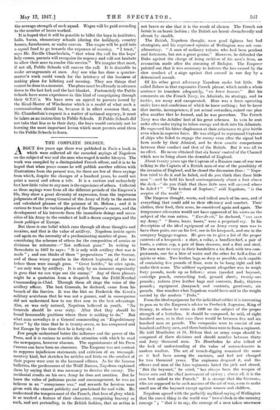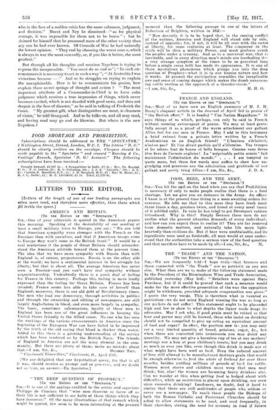THE COMPLETE SOLDIER.
ABOUT five years ago there was published in Paris a book in which were collected all the recorded sayings of Napoleon on the subject of war.and the men who waged it under his eyes. The work was compiled by a distinguished French officer, and it is to be hoped that when peace comes he will publish another edition with illustrations from the present war, for there are few of these sayings from which, despite the changes of a hundred years, he could not point a moral and adorn a tale. It is a curious and melancholy fact how little value to any man is the experience of others. Collected as these sayings were from all the different periods of the Emperor's life, they show a great diversity of expression, from the impetuous judgments of the young General of the Army of Italy to the mature and calculated phrases of the prisoner of St. Helena ; and it is curious to trace the various phases of the Emperor's career, and the development of his interests from the immediate doings and neces- sities of his Army to the conduct of half-a-dozen campaigns and the haute politique of Europe.
But there is one belief which runs through all these thoughts and maxims, and that is the value of artillery. Napoleon insists again and again on the necessity of a predominating number of guns. In considering the schemes of others for the composition of armies or divisions he reiterates—" Not sufficient guns." In writing to Bernadotte in 1807 he says " It is only with artillery that war is made " ; and one thinks of those " preparations " on the Somme, and of those weary months in the distant beginning of the war before there were enough guns. " Great battles," he cries again, " are only won by artillery. It is only by an immense superiority in guns that we can wipe out the enemy." Any of these phrases might be a quotation from a despatch from the Field-Marshal Commanding-in-Chief. Through them all rings the voice of the artillery officer. The best Generals, he declared, came from his branch of the Service. It was the blot- on Frederick the Great's military scuteheon that he was not a gunner, and in consequence did not understand how to use that arm to the best advantage. Also, as was only natural, Napoleon believed in youth. "No Generals should be over sixty. After that they should be found honourable positions where there is nothing to do." But what man nowadays is a General commanding an "Expeditionary Force " by the time that he is twenty-seven, or has conquered and lost Europe by the time that he is forty-six
Few people understood better the influence and the power of the Press, and it is curious to notice the attention with which he read the newspapers, however obscure. The appointments of his Press Censors can have been no sinecures. The Emperor was not content to suppress injudicious statements and criticism of an uncompli- mentary kind, but sketches for articles and hints on the conduct of their papers were sent to the harassed editors. As for the famous bulletins, the predecessors of the Wolff Bureau, Napoleon explained them by saying that it was necessary to deceive the enemy. The incidental results on his own Army he does not mention. But ho knew the value of judicious praise and encouragement, he was no believer in an " anonymous war," and rewards for heroism were given with the utmost publicity and proclaimed far and wide. He understood the temperament of the French, that love of glory which is so marked a feature of their character, recognizing bravery as such, and not pretending, in the British fashion, that an action is
not brave or else that it is the result of chance. Tho French are heroic in an heroic fashion ; the British are heroic shamefacedly and almost by stealth.
The British, Napoleon thought, were good fighters but had strategists, and his expressed opinion of Wellington was not com-
plimentary. " A man of ordinary talents, who had been prudent and fortunate, but not a great genius." However, he defended the Duke against the charge of being reckless of his men's lives, an accusation made after the storming of Badajoz. The Emperor pointed out that it was necessary to balance the loss caused by the slow conduct cf a siege against that caused in one day by a determined assault•.
Of his other great adversary Napoleon spoke but little. He
called Nelson in that expressive French phrase, which needs a whole sentence to translate adequately, "tar brave honnne." But his
comments on the French -Navy, its Admirals, its strategy, and its tactics, are many and exasperated. Here was a force operating wider laws and conditions of which he knew nothing ; but he knew that inertia, incompetence, if not actual cowardice, ruined one plan after another that he formed, and he was powerless. The French Navy was the Achilles' heel of his great schemes. In vain he sent order after order trying to infuse energy and dash into his Admirals.
He expressed his bitter displeasure at their reluctance to give brittle even when in superior force. He was obliged to reprimand. Captains of ships who failed to engage the enemy oven after the signal had been made by their Admiral, and he drew caustic comparisons between their conduct and that of the British. But it was all to no effect. He never obtained that six hours' control of the Channel which was to bring about the downfall of England. • About twenty years ago the Captain of a Russian man-of-war was talking to the Captain of a British man-of-war of the possibility of the invasion of England, and he closed the discussion thus : " Napo- leon tried to do.it and he failed, and do you think that these little men "—and he held his hand contemptuously about a foot above the deck—" do you think that these little men will succeed where he failed " "The trident of Neptune," said Napoleon, " is the sceptre of the world."
The Emperor thought, wrote, and talked much of his men, and of everything that could add to their efficiency and comfort. Their
clothes, their food, their arms, he considered again and again.- The temperance advocates would not have approved of his views on the subject of the rum ration. "Eau-de-vie," he declared, " can save
my Army." " Boots, boots, boots," were a perpetual cry. In his description of the ideal equipment of an Army every man was to have three pairs, one on his feet., one in his knapsack, and one in the company baggage-wagons. He goes on to give a list of the proper contents of a knapsack : a shirt, a collar, a handkerchief, a pair of booth, a cotton cap, a pair of linen drawers, and a flint and steeL The men were to carry in their bandoliers a tin flask with two com-
partments, one for a litre of water and the other for half-a-lit•re of spirits or wine. Two leather bags as deep as possible, each capable
of containing five pounds of flour, were to be hung right and left under their arms. The soldiers' equipment altogether was to weigh forty pounds, made up as follows : arms (musket and bayonet, cartridge pouch, entrenching tool, ground sheet), twenty-ono pounds ; rations (two leather bags and contents, flask), thirteen pounds ; equipment (knapsack and contents, greatcoat), six pounds. One wonders what Napoleon would have said to the weight carried by the modem " Poilu."
From the ideal equipment for the individual soldier it is interesting to pass on to the Emperor's advice to Frederick Augustus, King of Saxony, to whom he wrote in 1809 on the subject of the proper strength of a battalion. It should be composed, he said, of eight hundred men, as in that case there would be between five and six hundred men on parade. The companies were to consist of one hundred and forty men, and three battalions were to form a regiment.
He told Montholon at St. Helena that an army corps should be composed of three divisions and should number between thirty
and forty thousand men. To Montholon ho also talked of the lack of understanding of the value of entrenchments in modem warfare. The art of trench-digging remained the same as it had been among the ancients, and had not changed for two thousand years. The engineers despised it, and the officers and men of the Line regiments hated the pick and shovel. " But the bayonet," he cried, " has always been the weapon of brave men and the chief instrument of victory ; above all, it is the arm best suited to the French." It is strange that the Germans, who are supposed to be such masters of the art of war, seem to make small use of the bayonet except against women and children. - Napoleon agreed with the prdbably mythical saying of Wellington that the rarest thing in the world was " two-o'clock-in-the-morning courage " ; " that is to say, the courage of a man taken unawares
rho in the face of a sudden crisis has the same calmness, judgment, and decision." Murat and Ney he dismissed—" as for physical courage, it was impossible for them not to be brave " ; but he claimed for himself that he possessed more of the other variety than any one he had ever known. Of Councils of War he had naturally the lowest opinion. " They end by choosing the worst courze, which is always in war the most cowardly, or, if you like it better, the most prudent."
But through all his thoughts and maxims Napoleon is trying to express the inexpressible. "You must do so and so"; "In such cir- cumstances it is necessary to act in such a way "; " At Austerlitz I was victorious because—" And so he struggles on trying to explain the unexplainable. How is he to communicate his genius, how explain those secret springs of thought and action ? " The most important attribute of a Commander-in-Chief is to have calm judgment which receives a true impression of things, which never becomes excited, which is not dazzled with good news, and does not despair in the face of disaster," so he said in talking of Frederick the Great. " My greatest gift, what distinguishes me most, is clearness
of vision," he told Gourgaud. And so he talks on, and all may read,
and having read may go and do likewise. But where is the new Napoleon ?



























 Previous page
Previous page